- Home
- Landscape Prep
- Landscape Ideas
Landscaping With Palm Trees Ideas
Inspire Your Tropical Oasis
These landscaping with palm trees ideas will help you bring a lush, tropical atmosphere in your outdoor space.
Whether you're designing a backyard escape, a showstopping front yard, or a poolside paradise, palms will serve you, as graceful anchors or dramatic focal points.
In this guide, you’ll discover how to create layered, visually engaging gardens that highlight the unique charm of palm trees.
Let's enhance your outdoor space with color, texture, and flow.
Feeling overwhelmed by palm tree problems or confusing information?
You’re not alone. At Mission: Palm Trees, we help everyday palm lovers understand, grow, care for, and enjoy palms without puzzling jargon or exhausting research.
We Make Palm Tree Details Fun to Know
Start With a Theme
Before planting your first palm, set a clear visually aesthetic direction.
Choosing a theme not only influences your palm selection, but also guides your plant pairings, materials, and garden accessories.
Here are three popular design ideas:
- Tropical Resort - Choose lush, colorful foliage with bright, bold flowers like hibiscus, crotons, or elephant ears.
- Desert Oasis - Combine sculptural rocks, succulents, and drought-hardy palms like a Mediterranean Fan Palm.
- Coastal Retreat - Use sandy tones, driftwood features, and soft grasses like muhly or sea oats.
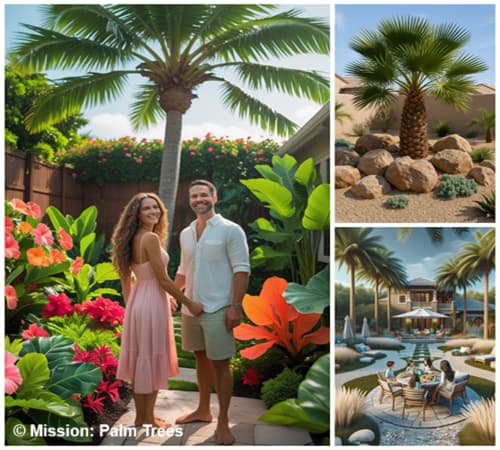
Can you think of any others?
Each theme brings its own personality. Choosing one unifies your landscape and creates a more harmonious experience.
Use Height Layering for Visual Effectiveness
Layering plants by height gives your garden some natural visual depth. This method mimics wild tropical environments.
Tall Tier - About 6–12ft/1.8–3.6m tall.
- Use medium palms such as Queen Palm or King Palm.
- You could plant cannas, hibiscus or a few Bird of Paradise plants.
- Add vertical accents like Traveler's Palms (Ravenala madagascariensis) or Plumeria for color and height.
Mid Tier - About 2–6ft/0.6–1.8m tall.
- You could plant one or two dwarf palms.
- Try Hawaiian Ti, crotons, or Ixora for structure and pops of color.
Ground Tier - Less than approximately 2ft/0.6m tall.
- Use groundcovers like mondo grass or liriope.
- Add texture with red lava rocks and/or coquina shells.
This three-tier brings in a balanced landscaping with your palm trees ideas plan. A technique that avoids a sparse, trunk-only appearance. But instead creates a lush, layered look you and your visitors will enjoy.
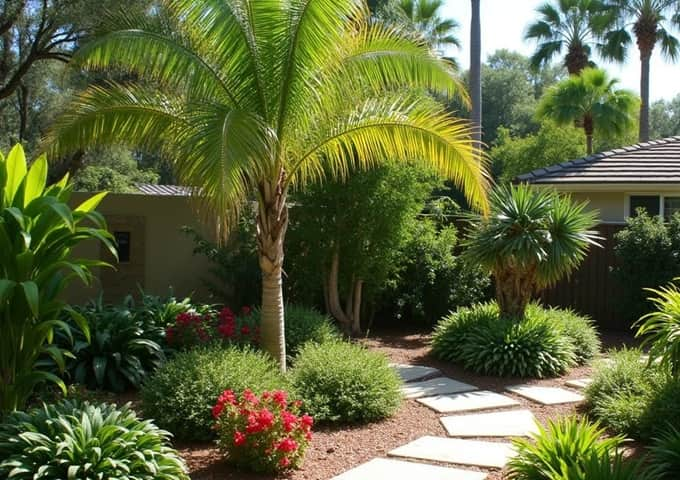 All levels of tropical plants with your palm.
All levels of tropical plants with your palm.Choose Companion Plants That Complement
Want your palm garden to feel complete?
Pair your palms with complementary plants. They'll add contrast or instead harmonize through shape, texture, and color.
Colorful Flowering Blooms
Add vibrance and seasonal interest with these colorful bloomers:
Hibiscus syriacus, known as Rose of Sharon or Rose Mallow.
- A tall perennial shrub (7–13ft/2–4m) with showy white, pink or red flowers.
- Great for privacy or backdrops.
Ixora coccinea, popularly called Flame of the Woods or Jungle Geranium.
- Compact (4–6ft/1.2–1.8m), with fiery flower clusters.
- Ideal for USDA Zones 9b–11.
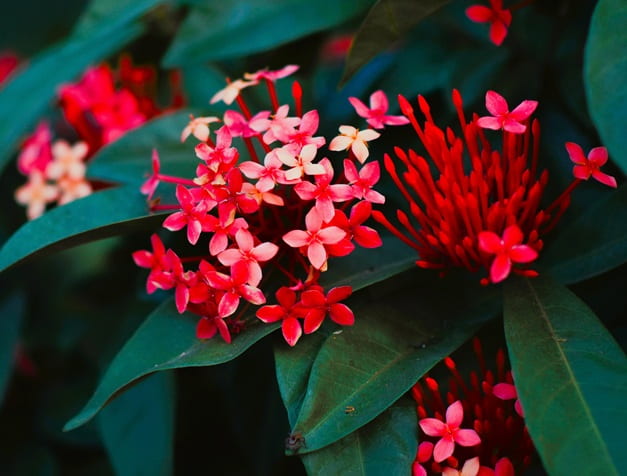 The small flowers gather together amidst the large deep green leaves.
The small flowers gather together amidst the large deep green leaves.Lantana horrida, with the common name of Wild Lantana.
- A hardy, fragrant shrub perfect for hot, dry regions of USDA Zones 9-11.
- Easy maintenance.
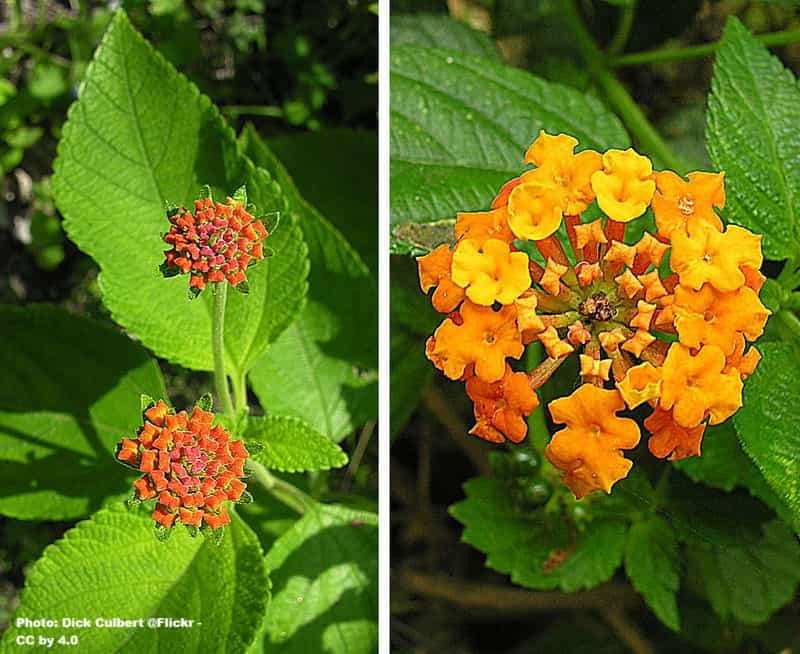 An overall view on the left, and close-up on the right.
An overall view on the left, and close-up on the right.Basic Care Tips for these flowering plants:
- Typically thrive in full sun and well-draining soil.
- Water deeply but infrequently, when the soil surface has fully dried out.
- Remember these will need protection from any cold snaps that come along.
Add Texture-Rich Foliage
Use foliage to add dimension and contrast to your planting beds that surround your palms:
These plants are great possibilities for you.
Ferns – Coming in feathery or broad-leaved forms.
- Their presentation is that of an overall soft texture.
- Keep in mind they love shaded, damp areas for determining if they'll work for you.
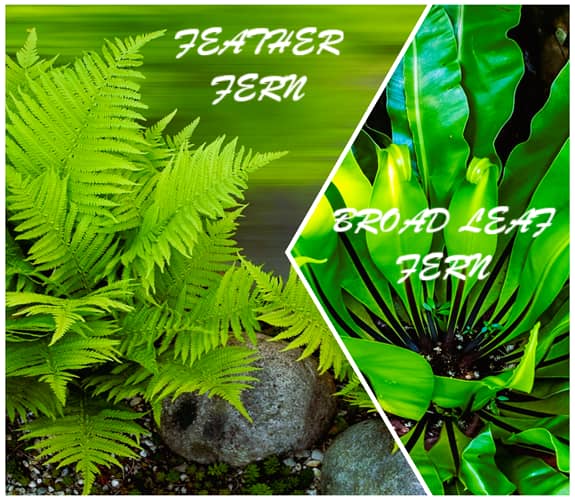 The feathery type is what many think of, yet ferns have broad leaves, too.
The feathery type is what many think of, yet ferns have broad leaves, too.Cordylines – Flowering trees popular in ornamental landscapes.
- Known as the Cabbage Tree (Cordyline australis), it's Native to New Zealand>
- Its full height runs to 66ft/20m. With long, colorful leaves in pinks, reds, or lime.
- It does well in temperate climates, especially near to coasts. Yet they're known to tolerate a range of temperatures from 20oF/-6.7oC to 100oF/37.8oC.
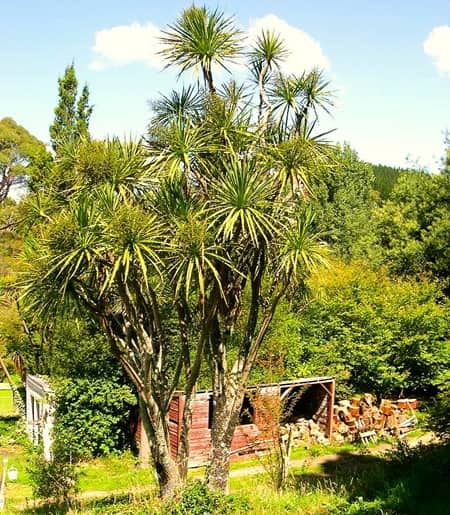 Cordyline australis growing in its native land.
Cordyline australis growing in its native land.[Above plants' reference: missouribotanicalgarden.org/PlantFinder/plantfindersearch.aspx]
Bromeliads – Members of the pineapple family, they store water in their leaves.
- Use them to light up shaded areas with their stunning foliage.
- They have a wide range of temperature tolerance depending on the species.
- Like a palm, the flowers are unremarkable. But the inflorescence (flower stalk) with the many blooms is amazing.
Low-Maintenance Groundcovers
Groundcovers are a very handy choice for landscaping with palm trees ideas.
They not only add completeness to Your Palm Tree Design Plan, but they also fill in gaps and help to prevent weeds. Here are some desirable species:
Mondo Grass - Ophiopogon japonicus is tidy and tufted.
- AKA called dwarf lillyturf, it's ideal for partial shade or along borders.
- Learn All about it in this free pamplet>
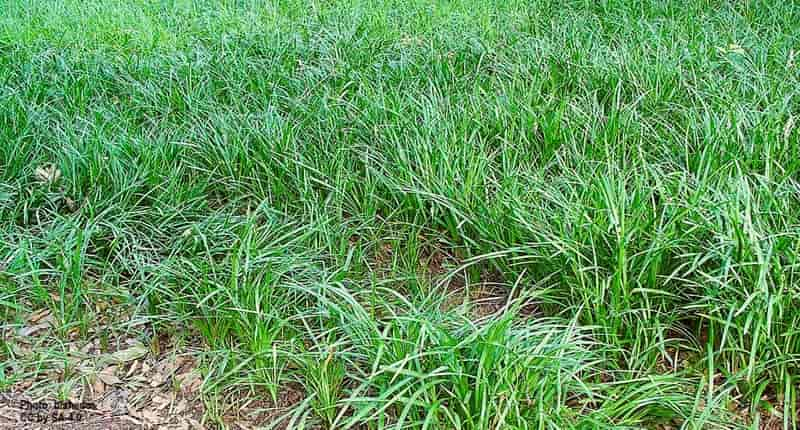
Liriope muscari – With perennial growth.
- It's known for its lavender blooms.
- Quite durable in USDA Zones 5–10.
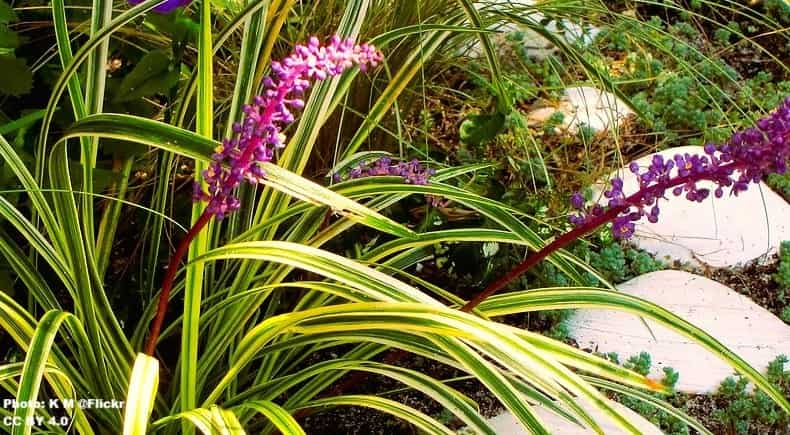 Lavender flowers sprouting along the flower stalk.
Lavender flowers sprouting along the flower stalk.Lantana montevidensis - Commonly called Trailing Lantana or Creeping Lantana.
- Gorgeous cascading lavender flowers are perfect for slopes or outdoor containers.
- It only gets 18-24in/46-61cm tall, and spreads to 4ft/1.2m.
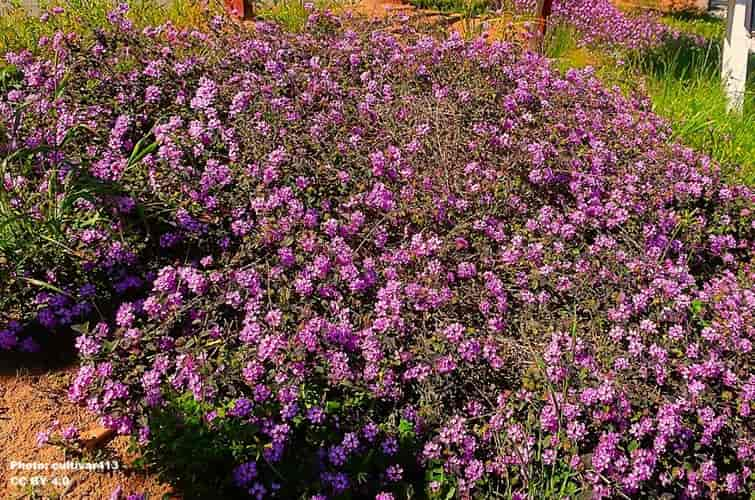
[Above last 2 plants' reference: missouribotanicalgarden.org/PlantFinder/plantfindersearch.aspx]
Emphasize Focal Accents
Let your palm garden tell a story.
Well-placed accents turn a collection of landscaping with palm trees ideas into an interesting design, for you to add in for your Landscape Around Your Headlining Palm.
GARDEN LIGHTING
- Uplight Your Palms at Night to create dramatic silhouettes.
- And to extend your tropical garden enjoyment into the evening.
STONE EDGING
- Use natural stone or pavers to frame your beds
- Adding neatness with crisp, clean lines.
WATER FEATURES
- Add in a small fountain, reflecting pool, or bubbling urn.
- They all add sound and motion for an added thrill.
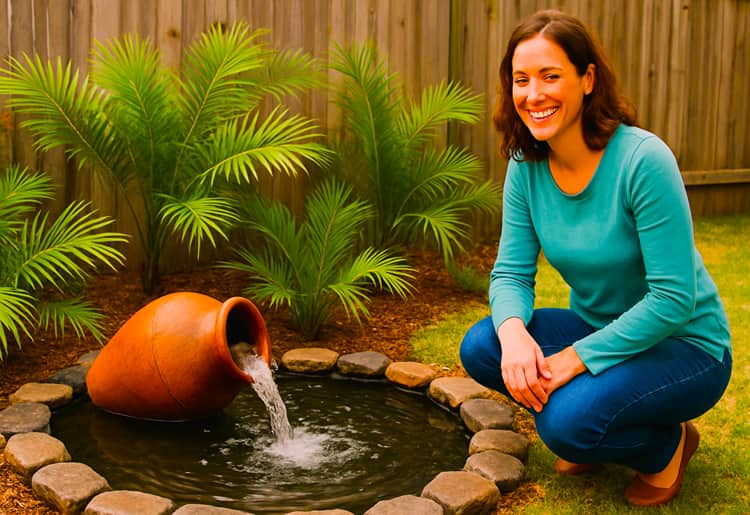
PATHWAYS
- Incorporate flagstone or shell walkways
- Giving an invitation to others for garden exploration.
- While roaming through, it helps define visitor movements.
DECOR ACCENTS
- Think of Accents You Can Add to add to your theme.
- Incorporate ceramic pots, driftwood sculptures, and garden benches.
- Even try tiki torches for exotic personality.
IMAGINE:
- A Showcase Palm lit from below, surrounded by low shrubs or dwarf Palms in Your Front Yard, for curb appeal.
- A Palm Nook with cozy seating beneath graceful canopy fronds. Or around your relaxing patio chairs.
- A Poolside Paradise complete with Potted Palms, lanterns, and breezy textiles.
Most Recent Article
-
Characteristics of a palm tree - What Are They? What Does it Mean?
We'll explore the characteristics of a palm tree in simple terms. Its roots, leaves, trunks, flowers, and fun facts that make palms unique.
Takeaways for Landscaping With Palm Trees Ideas
YOU'RE JUST GETTING STARTED!
Landscaping with palm trees with ideas is more than planting trees. It’s about arranging an outdoor experience. Layered heights, complementary foliage, textured groundcovers, and striking focal points work together to create a rich tapestry. To help immerse everyone in that tropical vibe.
There's even more to think about when using ideas to landscape with palm trees! Like more fabulous ideas for landscaping around a Palm Tree. What other plants to include? Maybe assorted tropicals, Like Those With a Palmy Look, cycads, yuccas etc.
Before starting your landscape, check on the Best Help With Your Palm Tree Design Prep.
Whether you’re aiming for beachy calm or exotic escape, palms can anchor your landscape and elevate your space into a true personal paradise.





